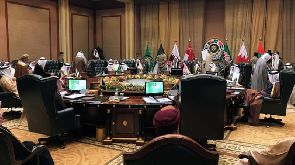A key regional summit of the six-nation Gulf Cooperation Council (GCC) countries has been cut short and will conclude on Tuesday, with all the delegates leaving Kuwait after a closed session.
The two-day summit is set to begin in Kuwait City exactly six months after three of the member states severed diplomatic and trade ties with Qatar.
The move comes as the United Arab Emirates (UAE) announced that it had formed a new economic and military partnership with Saudi Arabia.
Qatar’s emir, Sheikh Tamim bin Hamad Al Thani, has confirmed his attendance for the key summit, but there were no details on who would represent the three blockading countries – Saudi Arabia, the United Arab Emirates (UAE) and Bahrain – at the summit on Tuesday.
The agenda of this year’s summit, one of the most significant official encounters since the crisis erupted in June, has not been made public, but the Gulf crisis will be a top priority.
Saudi Arabia, Bahrain and the UAE cut ties with Qatar on June 5 after accusing it of supporting “terrorism”, allegations that Qatar strongly denies.
Kuwait sent out invitations to all GCC member states last week, but it was not clear whether all heads of state would attend the two-day summit. Oman said that another official would represent Sultan Qaboos bin Said al Said, while some reports indicated that Saudi Arabia’s King Salman may attend the 38th annual summit.
“The fact that the emir [of Qatar] and King Salman are going to the meeting and for the first time, it would be possible for them to sit together – I think it was a positive development already,” said Qatar University’s Luciano Zaccara.
Future of the GCC
The talks could define the very future of the bloc that was established in 1981 for closer economic, trade and security partnerships on the Arabian Peninsula.
In October, Kuwait’s emir, Sheikh Sabah Al Ahmad Al Sabah, who has been mediating the standoff, warned of the potential collapse of the GCC if the crisis continued.
In late October, the king of Bahrain said his country would not take part in any summit or meeting attended by Qatar unless Doha “corrects its approach”.
Qatar’s emir has agreed to resolve the crisis through dialogue, but Kuwait’s call for talks has not been accepted by the blockading countries.
The ongoing war in Yemen is also expected to be a topic of discussion. A Saudi-led coalition has been bombing the poorest nation in the Middle East since March 2015, creating one of the biggest humanitarian disasters of modern times.
The killing of former Yemeni President Ali Abdullah Saleh on Monday by the Houthi rebels, who control vast expanses of the country, has thrown the country into deeper chaos.








